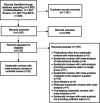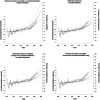Impact of air pollution and climate change on mental health outcomes: an umbrella review of global evidence
- PMID: 38727076
- PMCID: PMC11083864
- DOI: 10.1002/wps.21219
Impact of air pollution and climate change on mental health outcomes: an umbrella review of global evidence
Abstract
The impact of air pollution and climate change on mental health has recently raised strong concerns. However, a comprehensive overview analyzing the existing evidence while addressing relevant biases is lacking. This umbrella review systematically searched the PubMed/Medline, Scopus and PsycINFO databases (up to June 26, 2023) for any systematic review with meta-analysis investigating the association of air pollution or climate change with mental health outcomes. We used the R metaumbrella package to calculate and stratify the credibility of the evidence according to criteria (i.e., convincing, highly suggestive, suggestive, or weak) that address several biases, complemented by sensitivity analyses. We included 32 systematic reviews with meta-analysis that examined 284 individual studies and 237 associations of exposures to air pollution or climate change hazards and mental health outcomes. Most associations (n=195, 82.3%) involved air pollution, while the rest (n=42, 17.7%) regarded climate change hazards (mostly focusing on temperature: n=35, 14.8%). Mental health outcomes in most associations (n=185, 78.1%) involved mental disorders, followed by suicidal behavior (n=29, 12.4%), access to mental health care services (n=9, 3.7%), mental disorders-related symptomatology (n=8, 3.3%), and multiple categories together (n=6, 2.5%). Twelve associations (5.0%) achieved convincing (class I) or highly suggestive (class II) evidence. Regarding exposures to air pollution, there was convincing (class I) evidence for the association between long-term exposure to solvents and a higher incidence of dementia or cognitive impairment (odds ratio, OR=1.139), and highly suggestive (class II) evidence for the association between long-term exposure to some pollutants and higher risk for cognitive disorders (higher incidence of dementia with high vs. low levels of carbon monoxide, CO: OR=1.587; higher incidence of vascular dementia per 1 μg/m3 increase of nitrogen oxides, NOx: hazard ratio, HR=1.004). There was also highly suggestive (class II) evidence for the association between exposure to airborne particulate matter with diameter ≤10 μm (PM10) during the second trimester of pregnancy and the incidence of post-partum depression (OR=1.023 per 1 μg/m3 increase); and for the association between short-term exposure to sulfur dioxide (SO2) and schizophrenia relapse (risk ratio, RR=1.005 and 1.004 per 1 μg/m3 increase, respectively 5 and 7 days after exposure). Regarding climate change hazards, there was highly suggestive (class II) evidence for the association between short-term exposure to increased temperature and suicide- or mental disorders-related mortality (RR=1.024), suicidal behavior (RR=1.012), and hospital access (i.e., hospitalization or emergency department visits) due to suicidal behavior or mental disorders (RR=1.011) or mental disorders only (RR=1.009) (RR values per 1°C increase). There was also highly suggestive (class II) evidence for the association between short-term exposure to increased apparent temperature (i.e., the temperature equivalent perceived by humans) and suicidal behavior (RR=1.01 per 1°C increase). Finally, there was highly suggestive (class II) evidence for the association between the temporal proximity of cyclone exposure and severity of symptoms of post-traumatic stress disorder (r=0.275). Although most of the above associations were small in magnitude, they extend to the entire world population, and are therefore likely to have a substantial impact. This umbrella review classifies and quantifies for the first time the global negative impacts that air pollution and climate change can exert on mental health, identifying evidence-based targets that can inform future research and population health actions.
Keywords: Air pollution; climate change; cognitive disorders; dementia; mental health; post‐partum depression; post‐traumatic stress disorder; schizophrenia; suicide; temperature.
© 2024 World Psychiatric Association.
Figures


References
-
- Campbell‐Lendrum D, Neville T, Schweizer C et al. Climate change and health: three grand challenges. Nat Med 2023;29:1631‐8. - PubMed
-
- World Health Organization . Mental health and climate change: policy brief. Geneva: World Health Organization, 2022.
-
- Massazza A, Teyton A, Charlson F et al. Quantitative methods for climate change and mental health research: current trends and future directions. Lancet Planet Health 2022;6:e613‐27. - PubMed
-
- Fu P, Yung KKL. Air pollution and Alzheimer's disease: a systematic review and meta‐analysis. J Alzheimer's Dis 2020;77:701‐14. - PubMed
LinkOut - more resources
Full Text Sources

